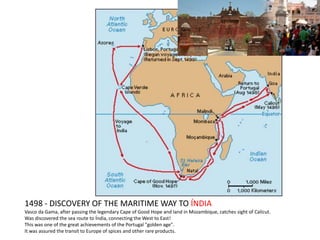Portuguese discoveries
- 1. Comenius Project -2012/14 MONSERRATE SECONDARY SCHOOL Viana do Castelo Portuguese Discoveries COLONIAL EMPIRE beginning, rise and fall
- 2. MARITIME EXPANSION Prince Henrique (1390- 1460) was the patron and inspirer of the first Portuguese navigation voyages. He launch Portugal in an era of discoveries between the fifteenth and sixteenth centuries that would give the country an worldwide empire.
- 3. MAP OF THE PORTUGUESE DISCOVERIES This Empire spanned through three continents: Africa, Asia and South America. The faraway places reached by Portuguese navigators allowed contact with other civilizations and cultures, the establishment of trade routes and the huge contribution to the acquisition of new knowledge.
- 4. Impelled by their thirst of knowledge and the richness that they could conquer, the Portuguese spread around the world. Let us make a brief "trip" through history, knowing the great moments in the maritime expansion.
- 5. CONQUEST OF CEUTA-1415 The achievement of this Muslim city in the North of Africa is considered by most historians as the beginning of the Portuguese expansion.
- 6. Madeira 1419/20-REDISCOVERY OF PORTO SANTO AND MADEIRA ISLANDS Rediscovery, since there were already knowledge about its existence. Navigators: JoÃĢo Gonçalves Zarco (Madeira), TristÃĢo Vaz Teixeira (Porto Santo) Nowadays these islands are major tourist destinations â this because of its climate, exceptional landscape and several other attractions.
- 7. 1427-AÃORESâS DISCOVERY Volcanic origin archipelago composed of nine islands. Its discovery could have been casual during a return trip from Africa coast. As Madeira archipelago, it is now national territory and also a great tourist destination.
- 8. 1434- CABO BOJADOR PASSING TROUGH It was folded for the first time by Gil Eanes. The legends of the âTerrified Sea" hovered the sailors imagination. People believed that was the point of the African coast where lied the end of the known world. From there life was not possible, the sea was not deep enough for navigation and currents were very strong. When fears were broken, exploring the coast becomes "easier".
- 9. THE WESTERN COAST OF AFRICA Slowly and methodically, Portuguese navigators were heading south of Cabo Bojador. Between 1435 and 1485, the better knowledge of the seas and navigation techniques, lead the way to new lands. Arguin becomes the first trading post on the African coast. Arriving to southernmost of Africa in 1487, Bartolomeu Dias reaches the great cape - Cape of Storms or Cape of the Good Hope. He demystify the legend of Adamastor giant.
- 10. Moçambique Angola Oceano PacÃfico Oceano AtlÃĒntico Portugal Diogo Cao arrives to Zaire in 1484 by starting the conquest of this region, including ANGOLA. Its occupation truly happens in the XVI century. Vasco da Gama on his voyage to India, arrives Mozambican coast in 1498. Around the ear of 1505 starts the Portuguese penetration and fixation in MOZAMBIQUE. These were the two largest Portuguese colonies in Africa.
- 11. 1494-TORDESILHASâS TREATY . The dispute and possession of the discovered and to discover lands led kings of Portugal and Castile (Spain) to a negotiating process. In this treaty, the world was divided into two parts by a meridian passing 370 leagues west of Cabo Verde: the lands to the east of this meridian would be Portuguese; lands to the west would Castilian.
- 12. 1498 - DISCOVERY OF THE MARITIME WAY TO ÃNDIA Vasco da Gama, after passing the legendary Cape of Good Hope and land in Mozambique, catches sight of Calicut. Was discovered the sea route to Ãndia, connecting the West to East! This was one of the great achievements of the Portugal "golden age". It was assured the transit to Europe of spices and other rare products.
- 13. 1500 â BRASILâS DISCOVERY In a second expedition to India, Pedro Alvares Cabral, maybe becouse he took a wrong route, arrives into Brasil. Over three centuries, populating and braving the discovered lands, the Portuguese exploit the natural resources found there (gold, sugar, timber, coffee, etc.) Brasil
- 14. PORTUGUESE ARRIVAL TO THE FAR EAST From India, arrived into China. Were the first Europeans to reach JAPAN (1542). In 1557 Portuguese set-up in Macau.
- 15. The End Of The Empire After many centurys of existency, whit the developments narrated here, the Portuguese Empire comes to na end. - The Islands of Madeira and Açores remained nacional territory. - In 1822, Brazil, achieved itÂīs independence. -In 1961 the India Unian Army invaded and anexed the territories of Goa, DamÃĢo e Diu. - Portugal gave back Macau to China in 1999. - The Democratic regime, instaured in Portugal in 1974, recognizes the indenpendency of the other colonies.














